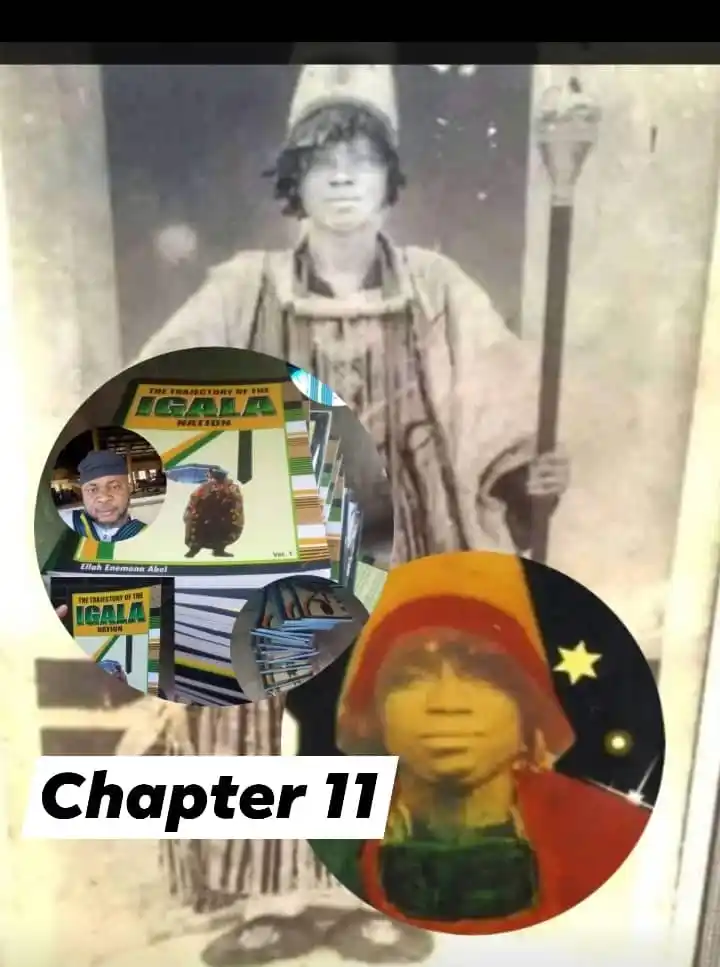
Comrade Enemona Abel Ellah
May 18, 2025 at 06:12 AM
THE ERASURE OF ATTAH AMEH OBONI LEGACY: A Colonial Agenda and the Complicity of Local Elites to eradicate the Igala kingdom effort to Nigeria independence
By Comrade Enemona Abel Ellah
Social Media Storyline – Episode 158
18 May 2025
History, when written by conquerors and upheld by their proxies, becomes a tool of suppression rather than a record of truth. Such is the case with Attah Ameh Oboni, an Igala monarch whose fearless stand against colonial rule during Queen Elizabeth II visit to Nigeria on 28th January 1956 remains one of the most under reported positively but powerful acts of resistance in Nigeria journey to independence.
This deliberate omission is not an accident. It is a systematic erasure orchestrated by colonial masters and perpetuated by their local puppets, who sought to control the independence narrative by sanitizing it of indigenous defiance and authentic African heroism. Instead of uplifting leaders who truly challenged imperial domination, history books were filled with sanitized tales of unity and “gracious transitional errors that keep Nigeria to where are today.”
Attah Ameh Oboni stood for dignity, sovereignty, and cultural pride. At a time when the presence of Queen Elizabeth was meant to symbolize colonial superiority and reinforce British authority, Ameh Oboni chose to confront that narrative directly. Dressed in his full regal attire, he refused to bow or shake the Queen’s hand, declaring instead:
> “Your Majesty, my people have lived and thrived long before your empire set foot on our soil. We do not seek your rule or your charity. We demand our freedom and the right to govern ourselves.”
His words were not mere protest—they were a thunderclap that echoed across the hearts of freedom-seeking and fighter in Nigerians. That single act of bold defiance, in the presence of both colonial and emerging Nigerian elites, could have—and should have—earned Attah Ameh Oboni his rightful place among Nigeria founding fathers.
But his name has been consistently omitted from the official history book of Sadauna of Sokoto, sir Amodu Bello, Awolowo, pa Azikiwe and others. School curriculums, national documentaries, and media retrospectives rarely mention him. Why? Because his legacy undermines the carefully crafted myth of a harmonious colonial handover. His story disrupts the falsehood that our independence was purely a gift, rather than the result of intense resistance and sacrifice by many unsung heroes.
Even worse, early Igala academicians and elites failed to document this pivotal history. Whether due to fear, lack of foresight, or alignment with colonial interests, they allowed this powerful story to fade from public consciousness, especially the Attah Aliyu Otrukpe Obaje Christopher. They failed to preserve the very soul of a people’s resistance—a story that could have inspired generations.
But we will not let it die.
We will continue to dig deep, uncover, preserve, and share the stories of Attah Ameh Oboni and other forgotten heroes. We must correct the injustice of erasure and restore the truth to our collective memory—not just for pride, but for justice, identity, and national healing.
Let this be a call to all Nigerian historians, educators, and media practitioners: rewrite the story with truth. Refuse to be instruments of historical suppression. Stand up for the heroes whose blood and boldness laid the foundation of our freedom.
A FULL STORY OF PRE- NIGERIA INDEPENDENCE: The Defiant Monarch AMEH OBONI:
An Unsung Catalyst for Nigerian Independence
As the winds of change blew through Nigeria, the British Empire, under the rule of Queen Elizabeth II, sought to solidify its control over its colonies. A grand visit by the Queen to Nigeria was planned, a symbol of colonial power and a gesture of goodwill. The visit aimed to strengthen ties and assert the British presence in the region.
Attah Ameh Oboni, known for his strong opposition to colonial rule, viewed the visit with suspicion and concern. He believed that the presence of the British monarch in his land was an affront to his people's sovereignty and dignity. Despite the political pressure and the potential consequences, Ameh Oboni was determined to make a stand.
Queen Elizabeth II Visit, on 28th January 1956, in the streets of Lagos was adorned with flags and decorations. Crowds gathered to catch a glimpse of the British monarch, and a grand reception was planned. Among the dignitaries invited to the event was Attah Ameh Oboni. His attendance was seen as a crucial show of unity and acceptance of British rule.
However, Attah Ameh Oboni had no intention of aligning with such acceptance. Dressed in his regal attire, He arrived at the venue, his presence commands respect and attention. As he approached the venue where Queen Elizabeth stood, a tense silence fell over the crowd. The Attah posture and expression were resolute.
Queen Elizabeth extended a hand shake in greeting, but Attah Ameh Oboni did not reciprocate. Instead, he looked directly into her eyes and, in a voice that echoed with authority, he spoke: Your Majesty, my people have lived and thrived long before your empire set foot on our soil. We do not seek your rule and your charity. We demand our freedom and the right to govern ourselves.
The atmosphere grew thick with tension. The British officials and Nigerian dignitaries were stunned, unsure how to respond. The Queen, maintaining her composure, replied, "Attah Ameh Oboni, your words are heard. It is not my intention to undermine your sovereignty but to foster a relationship of mutual respect and understanding."
Attah Ameh Oboni, unyielding, continued, "Respect begins with recognizing our right to self-determination. Until then, no amount of diplomacy can erase the chains of colonialism."
The Queen, acknowledged the gravity of the moment, nodded. "We shall discuss this further, Attah Ameh Oboni. Your voice is powerful, and it will be considered."
The encounter marked a pivotal moment in Nigeria's history. Attah Ameh Oboni defiance became “a symbol of resistance against colonial oppression”. His stance inspired many Nigerians to continue the struggle for independence, and his legacy lived on as a testament to the spirit of self-determination and cultural pride.
The Dawn of Independence (1960).
The Queen's visit, intended to solidify British influence, instead highlighted the growing desire for freedom among the Nigerians. It became clear that the era of colonial rule was nearing its end, and the call for independence could no longer be ignored.
Subsequent years, Nigerians quest for independence gained momentum, and on October 1, 1960, the nation finally achieved its long-awaited freedom. Attah Ameh Oboni courageous stand against colonialism remained a proud chapter in the history of Nigeria's journey to self-governance.
The Queen, startled but composed, replied:
> "Your words are heard… Your voice is powerful, and it will be considered."
Although not widely mentioned in literature and documentaries, Attah Ameh Oboni role in hastening Nigeria's independence is undeniable. His bold confrontation with Queen Elizabeth II showcased the indomitable spirit of the Nigerians and their unwavering desire for self-determination. His legacy continues to inspire generations, a symbol of the fight for justice and sovereignty.
The Forgotten Legacy
Today, Attah Ameh Oboni name is rarely mentioned, but his impact is undeniable. He was a catalyst in Nigeria journey to independence, a monarch who stood firm when it mattered most. His voice, his courage, and his refusal to bow remain a testament to true leadership and indigenous resistance.
This story is one of many buried by colonial interests and ignored by complicit elites. But we will reclaim our narrative. We will honor our heroes and tell our children the truth of how our nation was born. As Ibrahim Teaore of Bolkina false is doing.
For the full story, get a copy of my book:
Chapter 11 – The Trajectory of the Igala Nation
Contact: 08063147574

👍
😂
😢
7